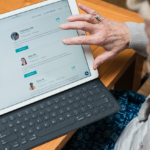Sleep problems in the elderly
Too little rest can increase risk of disease, depression and dementia.
Sleep problems in the elderly
As we get older, sleep problems become more pronounced. It’s common to discover that your Mum or Dad aren’t sleeping well, and too little rest can increase their risk of disease, depression and dementia.
Sleep is not just a chance to rest and recharge the batteries, sleeping well is essential to the physical and mental health of your loved ones, as well as their emotional wellbeing.
As they age, a good night’s rest becomes even more important for your elderly relatives. Sleep can boost concentration, improve memory, refresh the immune system and give their bodies the opportunity to repair the cell damage that a busy day has inflicted. It’s a time to repair and reboot.
The good news is you don’t need to toss, turn and torment yourself, these tips can help them to get the sleep they need.
Sleeping for health
Repeated studies have confirmed that too little sleep is bad for the health. Sleep deprivation can increase the risk of becoming obese, developing type 2 diabetes, having high blood pressure and heart disease, becoming depressed and even suffering a premature death.
There is also growing evidence that too little sleep may make the brain vulnerable to Alzheimer’s disease. Jeffrey Iliff, a researcher at Oregon Health & Science University, believes that “changes in sleep habits may actually be setting the stage” for dementia.
During sleep, the brain appears to clear out toxins linked to Alzheimer’s. With too little shut-eye these may accumulate and affect the brain, therefore sleep is vital for ongoing mind maintenance and bodily health.
Sleep and ageing
The trouble is, getting enough sleep is often easier said than done. As time goes by, sleep can become increasingly disturbed. But age alone doesn’t prevent sleep. Medications, chronic pain, dementia and disease can all contribute to sleeplessness.
The good news is that the single biggest contributor to insomnia in the elderly is completely avoidable.
Good sleep hygiene is not about keeping your bedroom clean, it’s about maintaining good sleep habits and a calm, restful sleep environment.
Irregular sleep hours, consumption of booze and caffeine before bed and too much daytime napping can all leave you tossing and turning into the small hours.
Keep it regular
A body clock works better when it knows what to expect. Try to encourage your elderly loved ones to go to bed and get up at consistent times. Lie-ins and naps may feel like a good idea at the time – but they could make it difficult to fall asleep and stay asleep through the night.
Cut out caffeine
Advise limiting coffee, tea and caffeinated drinks, especially in the evenings after 5pm. Buy caffein free herbal teas for your loved one to try in the evening.
Aroma therapy
Scents can help soothe in preparation for sleep, but candles can be dangerous in the home of an elderly person. A lavender bag under your loved one’s pillow can be a great alternative, helping them to drop off.
Turn down the lights
Bodies are programmed to respond to darkness and light, but dim lighting can be dangerous for elderly people who are prone to stumbles and falls. If you’re able to, turn the lights low once they’re in bed, before the lights go out. They might also benefit from using an eye-mask, which will help them to doze off and not be disturbed too early, when the sun rises.
Stay active
Regular exercise can help to reduce the risk of common diseases and conditions, not least because it helps with sleep, which enables cell rejuvenation. A walk in the fresh air, a game of golf or bowls or a leisurely swim can all promote good sleep.
Screen sense
Tablets, mobiles and TVs can be too mentally stimulating at night, and backlit screens have been shown to inhibit sleep. Reading in bed helps to calm and relax the mind, transporting the reader to distant places, perfect preparation for a good night’s sleep. If you haven’t already, you might look into buying your loved one a Kindle. These gadgets are lighter than most books, and the font can be made larger for tired eyes. They require very little charge time and can hold an entire library.
Speak to a doctor
Pain or disease can prevent good quality sleep. Arthritis, asthma, heartburn and dementia can all lead to poor sleep hygiene. If your loved one is having difficulty sleeping, or is up in the night to deal with frequent toilet trips, pain, or breathing troubles, speak to a doctor.
.
If your loved one is active during the night and good sleep hygiene isn’t helping, it might be that your sleep is also being affected. In the long run this isn’t good for you or for your loved one, and there are things you can do. Talk to your GP about your care options, or find a pre-approved private carer near you using our simple search tool. Overnight care can help you to relax in the knowledge that your loved one will be well looked after while you’re getting the rest you need. If you’re caring for your loved one full time, respite care can give you both a break. You do have options. If you have any questions, speak to a member of our team and they’ll be happy to provide you with answers.



